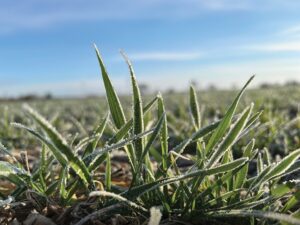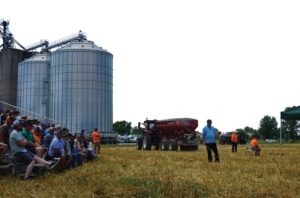Farming, finances, and finding balance
Conversations with business experts

elainefroese.com
(J.M.) WHAT DO FARMERS NEED TO KNOW ABOUT MANAGING PERSONAL AND BUSINESS FINANCES ON THE FARM?
(L.C.) Most farm businesses are deeply intertwined with a family’s home and lifestyle, adding extra layers of complexity to financial management. That’s why understanding how money works on a farm is essential, and that includes managing household and business finances.
There are a lot of moving pieces to a farm family’s finances, including household economics, financial documents, understanding how money generates wealth, business economics, cash flow, and debt management.
It’s just as important to keep living costs in check as the farm business expenses—and to make sure the two aren’t confused. Understanding the difference between investments and expenses is also crucial.
Maintaining separate business and personal bank accounts is most helpful for managing and tracking expenses. Creating and following a budget is another good resource for farm families as well. And if someone doesn’t have the necessary financial skills, including the basics like how to read and understand cash flow statements and balance sheets, they need to learn. These skills aren’t just important for the day-to-day financial management of the farm and household, but also for tax planning and farm succession.
WHAT CHALLENGES DO FARMERS FACE WHEN BALANCING LIFESTYLE EXPECTATIONS WITH SMART FINANCIAL MANAGEMENT?
(E.F.) Business and lifestyle expenses can add up—especially on a farm, where the family’s way of life is closely tied to the demands of their business. Understanding how lifestyle choices impact the business, how to manage debt responsibility, and the importance of monitoring cash flow are essential to farm management, especially for younger farmers who may just be learning about farm finances.
The first step in managing farm and personal finances is to have open, honest conversations with your partner—whether business or personal—to align your values with your financial expectations. Discussion topics should include your comfort level with debt, the amount of financial risk you are both willing to take, income expectations, and investment priorities. Getting on the same page, especially for couples who farm together, is essential for the success of both the farm business and personal relationships.
David Chilton, author of The Wealthy Barber, noted a trend in lifestyle spending among younger generations that he calls “granite top syndrome”. I agree with him and see the same spending tendency among young and new farmers. There appears to be considerable pressure on young farmers to keep up with one another. Whether it’s a shiny new truck, the latest equipment or a granite countertop in the kitchen, I’m concerned there may be a lack of understanding about lifestyle versus farm business spending and the difference between good and bad debt.
Good debt includes investments that will drive productivity or efficiency. Bad debt is consumer items or investments that don’t support the farm’s bottom line. And these types of lifestyle expenses— like granite countertops—are not good debt decisions. When it comes to making investment decisions, farm families need to check in with their values and ask themselves how their decision will support their values, impact their lifestyle, and their business.
WHAT TIPS CAN YOU SHARE WITH FARMERS?
(L.C.) Anyone starting a farm today knows just how much capital is required and how costly it is to get up and running. This puts extra pressure on managing farm finances, not to mention the financial stress. My best advice for farmers, no matter their age or level of experience, is to ask for help and learn from advisors. Build and work closely with a trusted team of advisors who are willing to teach you how to read and understand financial statements. Openly communicate with your team and partners to identify your goals, make the right decisions, invest wisely and live through your values.
(E.F.) Farmers today, especially younger farmers who are just starting out, are facing more risk, more zeros on their financial statements, and more tension during farm succession. Understanding and aligning each person’s beliefs and values will help inform and drive decision- making, including finances. For young farmers, I suggest they pause to evaluate the impact of their financial choices and ask themselves how their decision will affect their farm business, lifestyle and financial future. I also recommend farmers work with a team of advisors to help navigate the challenges and answer questions. •



























